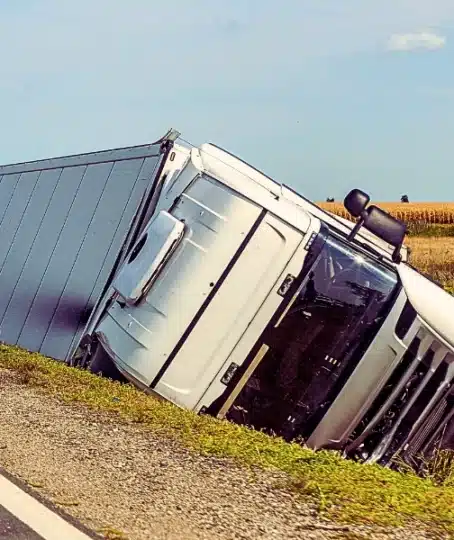
What to Do If You’re Injured in a Car Accident While Working in Illinois Work-related car accidents are common. Between...


How does the black box help a truck accident case in Illinois? Data found within a truck’s black box is instrumental in accident investigations and liability determination in a truck accident case. This device records and stores information regarding the truck’s condition before, during, and after a crash. Information like the vehicle’s speed, steering angles, brake application, and time of airbag deployment can be crucial in recreating the accident.
Black boxes in many new commercial trucks automatically wipe data within 30 to 60 days. Those installed in older trucks may store information for only a few days. Additionally, the trucking company owns and can easily access this data. The company may erase or modify the data to cover up a crash or reduce liability. That is why you need a truck accident lawyer immediately after a truck accident.
Your lawyer can take legal measures to keep the trucking company from interfering with the data. The lawyer can also help you overcome challenges in presenting black box data as evidence and collect additional evidence to reinforce your case.
If you were hurt in a truck accident in Illinois, you need to speak with our truck accident lawyers at Strong Law Offices for quality and personalized legal support. Call us today at 309-688-5297.

Black boxes, or Event Data Recorders (EDRs), monitor and record vehicle information. These computerized systems only record data when a driver is behind the wheel and the vehicle is moving. They keep track of driver safety, monitor vehicle’s operation on the road, and capture crash data. Key details recorded by these devices include:
EDRs log the truck's speed in the moments leading up to the crash. Analysis of this data can help determine whether the driver was above the stipulated speed limit.
The device also captures the specific location of the truck in the roadway. Was the truck moving in the correct direction? Was it using the correct lane? The logs will help answer these questions. Accident reconstructionists can use information about the vehicle's position to determine how the accident happened.
An EDR can record engine performance metrics like revolutions per minute (RPM) and fuel usage. Investigators can review this data to determine whether the accident could have resulted from issues with the engine.
EDRs can determine whether a truck operator is wearing a seatbelt, the number of hours spent behind the wheel, and whether the operator was using a cell phone at the time of the crash.
A black box can record whether the driver stepped on the brakes moments before the crash and the force used. This information can help the investigators figure out if the driver attempted to stop the vehicle. If so, the investigators will determine whether the brakes were effective.
The black box also logs the time of airbag deployment during a crash. This data can give an insight into the seriousness of the accident.
The data from the truck's black box can support your case in a number of ways:
Black boxes provide information on what happened immediately before, during, and after the crash. They are usually installed in the truck’s engine or driver compartment. They can still record and keep data even in a crash that leads to fire or significant damage. The reason is that these devices are made to endure high temperatures and the physical force of a crash.
A truck accident lawyer can examine the black box information to determine what transpired on the road. The lawyer can then use that information alongside truck driving logs and maintenance reports to recreate the specific circumstances of the crash.
You must prove liability against the truck driver, trucking company, or other party to win a truck accident case and recover compensation. Careful analysis of black box data can reveal factors that contributed to the truck crash and who was to blame.
The data may show that the driver violated a traffic law or failed to adhere to safety regulations. The driver may have, for instance, failed to stop at the red light or was driving without a seatbelt. In this case, the truck driver will be liable for your accident and ensuing injuries.
The information may also show that the truck operator did not comply with the hours-of-service (HOS) regulations. You can use this evidence of non-compliance to hold both the truck driver and the trucking company liable for the crash.
Black box data is crucial in corroborating statements from your witnesses in a truck accident lawsuit. Your witness may, for instance, state that the other driver was driving at high speeds or weaving through traffic. The recorded data can support this claim by showing the truck operator was driving above the recommended speed limit or lane weaving.
Black box data is a key component of the accident reconstruction process. Accident reconstruction professionals often cite this data in their reports or testimonies. A data-supported accident reconstruction report or testimony can be convincing in court and better your chances of a decent financial recovery.
Although black box data is crucial for accident investigation and liability determination, using it as evidence presents numerous challenges. Knowing these challenges and how to address them can position you for the best possible outcome from your truck accident case.
Trucking companies and their insurance providers can easily access the black box data. They may erase, modify, or corrupt the data to minimize liability or avoid it altogether. Fortunately, your lawyer can write a detailed spoliation letter and send it to these parties.
This letter notifies the involved parties of an insurance claim or lawsuit. It then reminds them of their legal duty to maintain the integrity of any evidence relevant to the claim or lawsuit.
As stated earlier, EDRs do not keep data for too long. They automatically start recording over existing logs once a specific duration has passed, usually 30 days. Early intervention by your truck accident lawyer can ensure this data is accessed and properly stored on time.
EDR data belongs to the trucking company. The company may raise privacy concerns regarding access and usage of this information. Luckily, your attorney can strictly adhere to the right legal procedures to get hold of this information and use it correctly. The attorney may, for instance, seek consent from the truck company or use a court order to access the data.
EDR can sometimes develop technical problems, which may cause them to capture inaccurate data. Your attorney will, however, carefully review the logs to determine whether there are inconsistencies. If so, the attorney will look for other evidence that can help support your claim or lawsuit.
EDR data is often hard to analyze and interpret, even for seasoned attorneys. Your attorney may bring an accident reconstruction professional on board to interpret the data correctly. The accident reconstructionist can also prepare a report that you can use to back up your claim or lawsuit. If necessary, your lawyer can call this expert to testify in court and ensure the judge or jury understands how the data proves negligence against the trucking company or driver.
Besides black box data, you need to collect other supporting evidence to help you sue a trucking company for negligence. Your lawyer can help you gather and evaluate other types of evidence to ensure they are sufficient and reliable.
State laws and federal regulations require trucking companies to have competent professionals inspect and maintain their vehicles regularly. Some companies, however, do not adhere to the safety inspection and maintenance requirements. The outcome is drivers operating vehicles with multiple faulty parts and increasing the likelihood of an accident.
Truckers must keep a Driver Vehicle Inspection Report (DVIR) as evidence of their adherence to FMCSA rules. The report should cover the inspection of accessories or components necessary for safe and effective truck operation. These accessories or parts include the steering wheel system, tire, wheels, or rims, braking system, and emergency equipment.
The Blood Alcohol Concentration (BAC) limits for truck drivers in Illinois are strict. The BAC limits for non-commercial drivers stands at 0.08%, but that of commercial truck drivers is 0.04%. So, if the alcohol test after a truck accident shows that the driver had a BAC of more than 0.04%, then that driver will be to blame for the crash.
High BAC levels impact a truck operator’s judgment. The operator will be slow to respond appropriately when faced with an unfamiliar situation.
Obtain a copy of the test result report from the officer in charge of BAC testing. Let your lawyer analyze the report to determine its reliability and admissibility in court.
Cell phone use result in distracted driving, which is a leading cause of motor vehicle accidents on Illinois roads. In fact, distracted driving accounted for 9,432 accidents in Illinois in 2020. The calls and text messages a driver receives or sends using his or her cell phone can help back up your truck accident lawsuit.
Truck drivers may assume they can operate a fast-moving truck while talking on their phone. Even with a hands-free system to lower the risk of in-cab phone usage, drivers engage in distracted activities like taking photos and videos or browsing the internet.
You can obtain phone call details and messaging data through a subpoena to the phone company or wireless service provider.
Medical records can link your injuries directly to the truck accident. They will also show how your injuries will impact your life. These records include medical reports, physician's notes, hospital discharge sheets, treatment documents, and prescriptions.
The impact of a truck accident goes beyond physical and emotional harm. You may suffer serious financial implications, especially if you miss work due to your injuries. Your employment and income documents are invaluable proof of your lost wages or income.
These documents include the latest pay stubs, a job offer letter, and a letter from your employer outlining how long you have missed work because of your injuries and how much money you have lost. Invoices, payment receipts, and contracts can help prove your lost wages or income if you are a freelance worker.
Obtaining the contact information of anyone who saw the accident or rendered help at the accident scene is one of the things you should do after a truck accident. Eyewitness statements provide a neutral account of the accident, complete information gaps, and introduce credibility to your case.
Footage from surveillance or traffic cameras close to the accident scene can show what occurred during the accident. It helps your lawyer understand the sequence of events and identify all at-fault parties.
Videos and photos taken at the scene can show the position of the involved vehicles, skid marks, road conditions, and weather conditions. They can show dents, scratches, or other types of damage to the truck. Visual proof of your injuries right after the crash can show their severity.Black box data and other supporting evidence can increase your chances of winning a truck accident case. At Strong Law Offices, we can help you obtain, organize, and present this evidence to ensure you recover the highest possible compensation. Contact us today for a free case evaluation.

What to Do If You’re Injured in a Car Accident While Working in Illinois Work-related car accidents are common. Between...

Why Pedestrian Accidents in Parking Lots Surge During Summer in Illinois As temperatures rise, more individuals tend to engage in...

Drowsy drivers are a serious and often overlooked danger on Illinois roads. Each year, fatigued drivers contribute to thousands of...